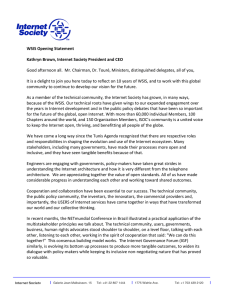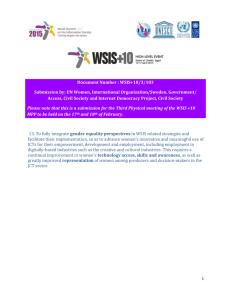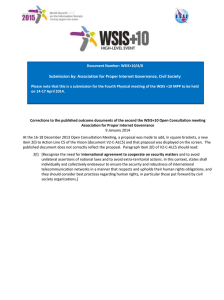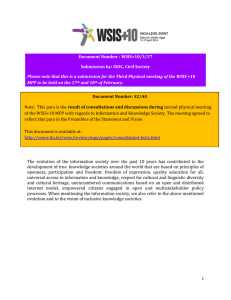WSIS+10 High-Level Event Open Consultation Process Official Submission Form #1 on the
advertisement
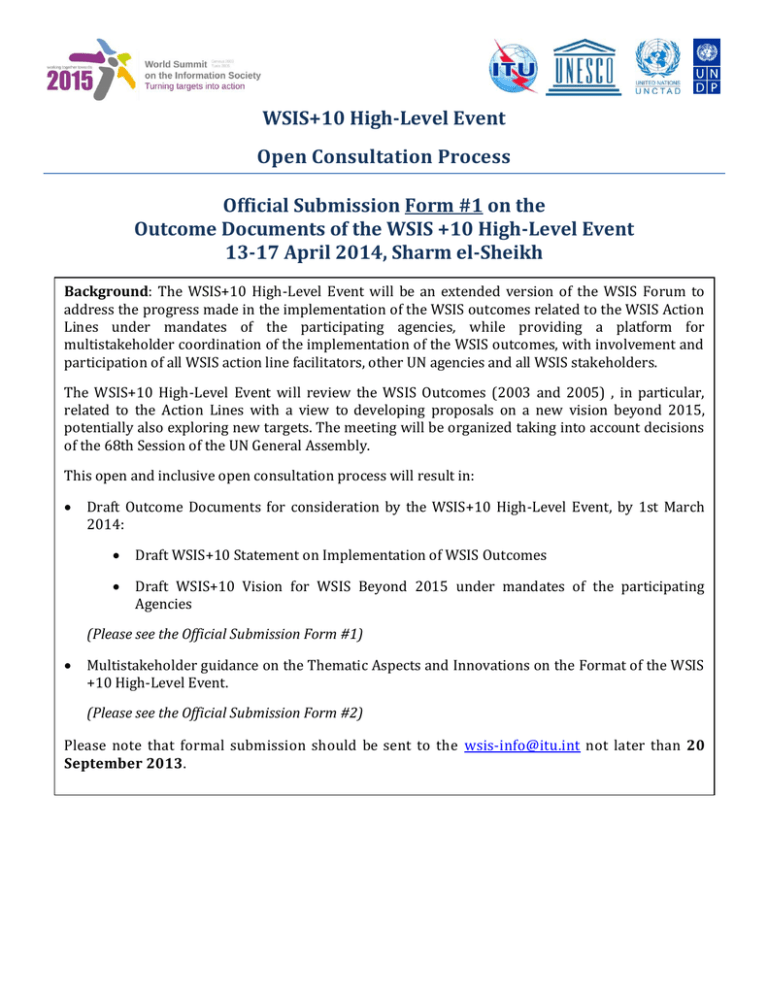
WSIS+10 High-Level Event Open Consultation Process Official Submission Form #1 on the Outcome Documents of the WSIS +10 High-Level Event 13-17 April 2014, Sharm el-Sheikh Background: The WSIS+10 High-Level Event will be an extended version of the WSIS Forum to address the progress made in the implementation of the WSIS outcomes related to the WSIS Action Lines under mandates of the participating agencies, while providing a platform for multistakeholder coordination of the implementation of the WSIS outcomes, with involvement and participation of all WSIS action line facilitators, other UN agencies and all WSIS stakeholders. The WSIS+10 High-Level Event will review the WSIS Outcomes (2003 and 2005) , in particular, related to the Action Lines with a view to developing proposals on a new vision beyond 2015, potentially also exploring new targets. The meeting will be organized taking into account decisions of the 68th Session of the UN General Assembly. This open and inclusive open consultation process will result in: Draft Outcome Documents for consideration by the WSIS+10 High-Level Event, by 1st March 2014: Draft WSIS+10 Statement on Implementation of WSIS Outcomes Draft WSIS+10 Vision for WSIS Beyond 2015 under mandates of the participating Agencies (Please see the Official Submission Form #1) Multistakeholder guidance on the Thematic Aspects and Innovations on the Format of the WSIS +10 High-Level Event. (Please see the Official Submission Form #2) Please note that formal submission should be sent to the wsis-info@itu.int not later than 20 September 2013. A. Your Information Title: Choose an item. First name: Nigel Organization: ICANN Organization type: Civil Society Last name: Hickson Country: Belgium B. Formal Input on the WSIS+10 High-Level Event Outcome Documents Referring to the background documents i.e. the WSIS +10 Visioning Challenge, the Final Statement and Final Recommendations from the WSIS+10 Review Event Towards Knowledge Societies for Peace and Sustainable Development, the Booklet WSIS Forum 2012 & 2013: Identifying Emerging Trends and a Vision Beyond 2015 and the WSIS Forum 2013 Outcome Document, all WSIS Stakeholders are kindly invited to provide formal submissions and inputs towards the Outcome Documents of the WSIS+10 HighLevel Event. 1. Draft WSIS+10 Statement on Implementation of WSIS Outcomes (Please note that the anticipated length of this Statement is two pages) Since the two Summits, in 2003 and 2005, WSIS Stakeholders have made every effort in implementing a common vision of the Information Society. Overall; a) What are the main achievements in the area of the information society, in particular, in the implementation of the WSIS Action Lines, in the past ten years? The Information Society has grown immensely in scale and importance over the past ten years. In that timeframe, the number of Internet users has increased 250% to 2.7 billion people. Over the past five years alone, fixed-broadband prices for consumers (as a share of GNI per capita) dropped by 82%. An array of new information-based and entertainment services has flourished to provide everything from social media to e-government applications in every region of the globe. Each of the WSIS Action Lines has played a part in this ongoing transformation. WSIS Action Lines have also helped to raise awareness within the international community about the challenges many communities continue to face to realize the benefits of the Information Society. This achievement has focused attention on the need to develop solutions suitable for developing and lessdeveloped countries to build an inclusive Information Society. While challenges yet remain, myriad successes and the continued rapid growth of the Information Society across every economy stand as a testament to the ongoing evolution. b) What key identified challenges would need to be addressed in the next 10 years? The application of the WSIS Action Lines does not sufficiently reflect the importance of the multistakeholder process in enabling the Internet to flourish. The decentralized decision-making structure (such as seen in ICANN) has allowed different multistakeholder organizations to focus on their areas of expertise, in order to develop and disseminate international best practice. This structure should be supported and strengthened over the next 10 years by the WSIS process. ICANN stands ready to play its part in this. The WSIS process should also support all stakeholders in engaging with the multistakeholder organizations that are at the forefront of international best-practice on critical issues, such as spam and cybersecurity. Increasing participation in the multistakeholder organizations by all stakeholders from developing countries will help to further disseminate best-practice, improving security, and enable more users to benefit from innovative technologies and policies. c) What do the WSIS Stakeholders envision for an information/ knowledge society ensuring that the youth, women, poor, persons with disabilities and indigenous peoples benefit from the enormous opportunities provided by the ICTs? To enable all stakeholders to benefit from the opportunities enabled by the Internet, it must remain open, single, secure and universal. The WSIS process can support this by broadening support for the multistakeholder model, and emphasizing the benefits of the decentralized decision-making structure to ensure participation of youth, women, poor, persons with disabilities and indigenous peoples. Multistakeholder Internet organizations (such as ICANN) are actively engaged with widening participation from all communities and stakeholder groups. At ICANN all stakeholders, from wherever globally, can participate at meetings. 2. Draft WSIS +10 Vision for WSIS Beyond 2015 under mandates of the participating agencies (Definition of new priorities and objectives for WSIS Action Lines beyond 2015) Please note: Participating agency refers to the Agencies tasked by the WSIS Outcomes to lead facilitation of WSIS Action Lines; See Annex to the Tunis Agenda for the Information Society. a) In your opinion, what are the key emerging trends in the Information and Communication Technology (ICT) landscape that should be considered in the implementation of WSIS Action Lines beyond 2015? Please specify the Action Line you are providing an input for. Please note: You may wish to refer to the WSIS Forum 2012 & 2013 Booklet on Identifying Emerging Trends and a Vision Beyond 2015, available at www.wsis.org/review/mpp. С1. The role of public governance authorities and all stakeholders in the promotion of ICTs for development o The central role that the Internet now plays in many areas of life, including commerce and the protection of human rights, has turned attention to the decision-making structures within the multistakeholder model. For these structures to continue to succeed, it is important that all stakeholders, from all countries, engage in public governance authorities and multistakeholder organizations at all levels. Successfully overcoming development challenges through ICTs can only be addressed with the input and active participation of all stakeholders in a community. Stakeholder participation faces problems of significant expense in attending all of the meetings held by various bodies and multistakeholder organizations. However, remote participation facilities, and the availability of fellowships, mean that it is should now possible for more and more stakeholders to engage with a wide range of multistakeholder organizations. С2. Information and communication infrastructure o Click here to enter text. C3. Access to information and knowledge o Click here to enter text. C4. Capacity building o Many multistakeholder organizations (including ICANN) are now offering capacity building Internet-related issues to stakeholders in developing and less-developed countries. The ability to harness the Internet to enable remote participation has dramatically expanded the reach of such training. It is expected that increasingly organizations will make use of innovative technology to deliver capacity building, reducing the cost of organizing capacity building events, and allowing training to be provided simultaneously to stakeholders at different location, potentially in a number of different countries. C5. Building confidence and security in the use of ICTs o Increasingly, stakeholders are aware of the importance of cybersecurity to protect their ICT infrastructure and data. We expect this trend to continue; and thus this Action Line should support the identification of appropriate tools. This will include innovative technology and research developed by the business and technical communities, as well as best practice elaborated by the multistakeholder organizations involved in security issues. For example, ICANN is responsible for ensuring the stability and security of the Internet’s domain name system. ICANN’s experience actively soliciting the views of all stakeholders in an ongoing basis has proved critical to successfully fulfilling its mission. The open nature of the multistakeholder process has proved adept at developing innovative solutions to technical and policy problems. The WSIS process should guide governments to look beyond solely legislation and government-led solutions, in order to both harness the existing knowledge and expertise of the multistakeholder organizations, and engage with them to enhance and improve the existing solutions. C6. Enabling environment o A key emerging trend is the increased understanding, by all stakeholders, of the ability of the multistakeholder model to consider the interests and concerns of all participants engaged in a process before reaching a decision. This increased understanding has led to a widening of participation, and a broadening of the issues considered by multistakeholder organizations before they reach a decision. As well as engaging with the multistakeholder model on an international level, governments are also realizing the importance of working with all stakeholders in a multistakeholder environment when developing national policy. The WSIS process can play a role in supporting best practice in how to achieve this. C7. ICT Applications: o E-government Click here to enter text. o E-business Click here to enter text. o E-learning Click here to enter text. o E-health Click here to enter text. o E-employment Click here to enter text. o E-environment Click here to enter text. o E-agriculture Click here to enter text. o E-science Click here to enter text. C8. Cultural diversity and identity, linguistic diversity and local content o Since the commencement of the WSIS process, the need for all people to have the opportunity of expressing themselves online in their own language has grown in importance. The development of internationalized domain names (IDNs) by ICANN – now being further effected through the expansion of the gTLD space - has helped to enable more communities to engage with the Internet in their own language. The WSIS process can help to educate all stakeholders on how to take advantage of the opportunities enabled by IDNs, and enable the development for communities using their own language. C9. Media o Click here to enter text. C10. Ethical dimensions of the Information Society o Click here to enter text. C11. International and regional cooperation o The roles of international, multistakeholder organizations are well-respected within the global community. There is an emerging trend for increasing engagement by developing countries, and the implementation of this Action Line should help to broaden and deepen this engagement and cooperation. In ICANN the development of Regional Strategies; especially in Africa, the Middle East and Latin America are, inter-alia, addressing developmental requirements with respect to the DNS sector. b) What are areas that have not been adequately captured by the framework of the existing 11 WSIS Action Lines and would need to be addressed beyond 2015? Please specify the Action Line you are providing an input for. С1. The role of public governance authorities and all stakeholders in the promotion of ICTs for development o Click here to enter text. С2. Information and communication infrastructure o Click here to enter text. C3. Access to information and knowledge o Click here to enter text. C4. Capacity building o More should be done to highlight and explain the different capabilities and expertise of organizations such as UNESCO, ITU, ICANN, ISOC, IETF, and others. All stakeholders should have sufficient information available to them in order to select the organization best suited to offer best-practice solutions, or to provide capacity building and training, on a specific topic. Furthermore, the business and technical communities have implemented, and should continue to broaden, efforts to build capacity in ICTs. C5. Building confidence and security in the use of ICTs o The WSIS process should aim to educate government officials on non-legislative solutions available to them, and facilitate bringing together technical experts - from the business community and civil society - and policy makers in developing countries. One example where this approach can improve confidence in the use of the Internet is security. As the issues faced by the stakeholders engaged with Internet security develop rapidly it is difficult for legislation to keep up with the pace of technological change. Engaging with, and benefiting from, international best-practices and policies developed by the multistakeholder organizations can be a more effective way to enhance security for all stakeholders. C6. Enabling environment o The development of enabling environment is not purely government driven. There should be a greater focus on how governments can learn from the guidance of civil society and business led organizations, many of which already have effective bestpractice guidance on issues of critical importance to an effective Internet and an inclusive Information Society. C7. ICT Applications: o E-government Click here to enter text. o E-business Click here to enter text. o E-learning Click here to enter text. o E-health Click here to enter text. o E-employment Click here to enter text. o E-environment Click here to enter text. o E-agriculture Click here to enter text. o E-science Click here to enter text. C8. Cultural diversity and identity, linguistic diversity and local content o The goals of this Action Line are more likely to be achieved if there is a focus on all stakeholders participating with the Internet multistakeholder organizations. There should also be education about the range of fellowships available for participants at the meetings of the multistakeholder organizations, as well as the opportunities for remote participation. The multistakeholder model has shown that it is well-suited to improving cultural diversity on the Internet, but this can only continue if stakeholders are made aware of the tools available which exist to widen participation from developing and lessdeveloped countries. C9. Media o Click here to enter text. C10. Ethical dimensions of the Information Society o Click here to enter text. C11. International and regional cooperation o A large body of expertise and best practice on Internet issues has been built up by the international and regional multistakeholder organizations and through the evolvement of national and regional IGFs. Beyond 2015, there should be an increased focus on supporting the engagement by developing countries in the multistakeholder organizations, and in national and regional IGFs, so that developing countries to benefit from the expertise and best-practice of the multistakeholder organizations. In turn the knowledge and experiences of stakeholders from developing countries will enhance future outputs from the multistakeholder organizations, adding to the know-how of the international community. c) In your opinion are there any priority areas that need to be addressed in the implementation of WSIS Beyond 2015. ICANN believes that the Action Lines have demonstrated themselves to be flexible and adaptive in addressing the evolving challenges of the Information Society over the past ten years. Thus, the existing Action Lines have proved sufficient to continue building an inclusive Information Society. In many ways, what is needed in implementing WSIS Beyond 2015 is renewed attention to how to deepen and strengthen the actions taken in implementing the Lines (with lessons learned over the past ten years). With specific regard to Internet-related issues, priority should be given to how all stakeholders can build on existing best practice. Resources will be unnecessarily wasted if the WSIS process looks to revisit issues where multistakeholder organizations have already developed expertise and bestpractice solutions. Priority should also be given to ensuring that the multistakeholder model remains open and decentralized. The multistakeholder model has created an enabling environment within which innovation has flourished and the Internet has swiftly developed in response to the needs of stakeholders. The WSIS process should focus on supporting and developing the existing multistakeholder organizations. 3. Ensuring accountability of the WSIS Action Lines beyond 2015 (Targets and Indicators for an open and inclusive information/knowledge society for all beyond 2015) Please note that information provided under this point will be relevant to the second physical meeting of the open consultation process on WSIS+10 High-Level Event. a) How can the monitoring and evaluation of future implementation of the WSIS process, in particular, the Action Lines be better enabled? Click here to enter text. b) What are the priority areas that the post-2015 WSIS process should focus on and which goals and targets could monitor the new vision for WSIS beyond 2015? Priority areas should include increasing participation at the meetings of multistakeholder organizations, both in person and through remote participation. The goals should be to increase both the number of countries attending meetings, and the range of stakeholders from each country. 4. Any additional comments or suggestions None
